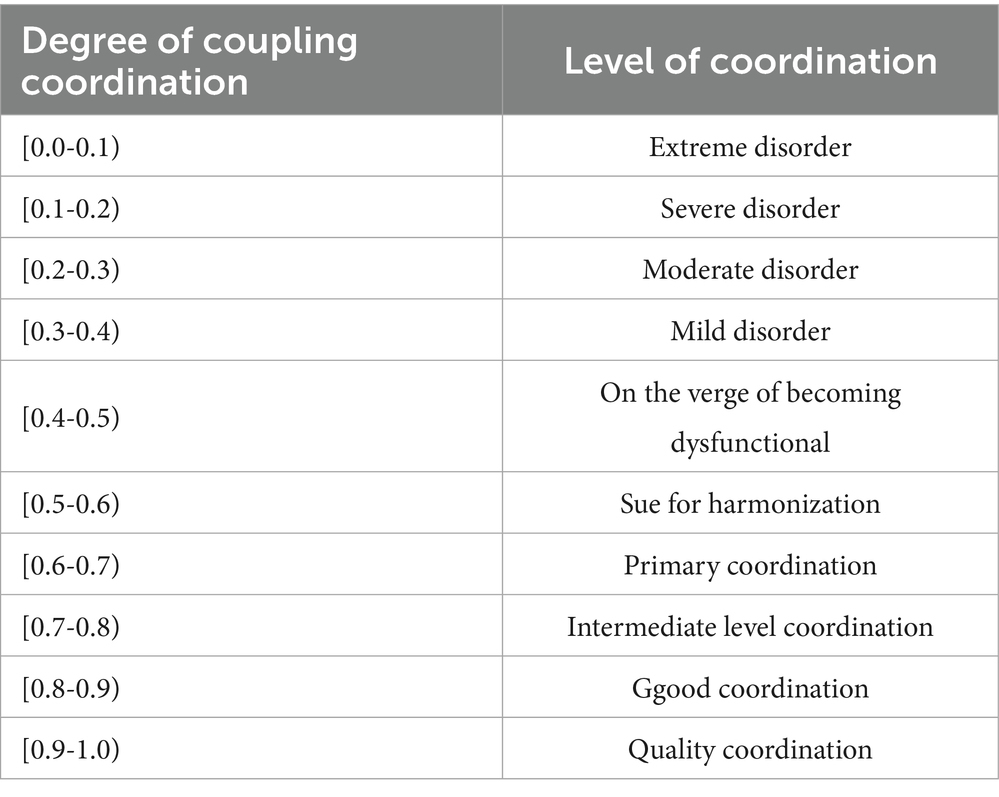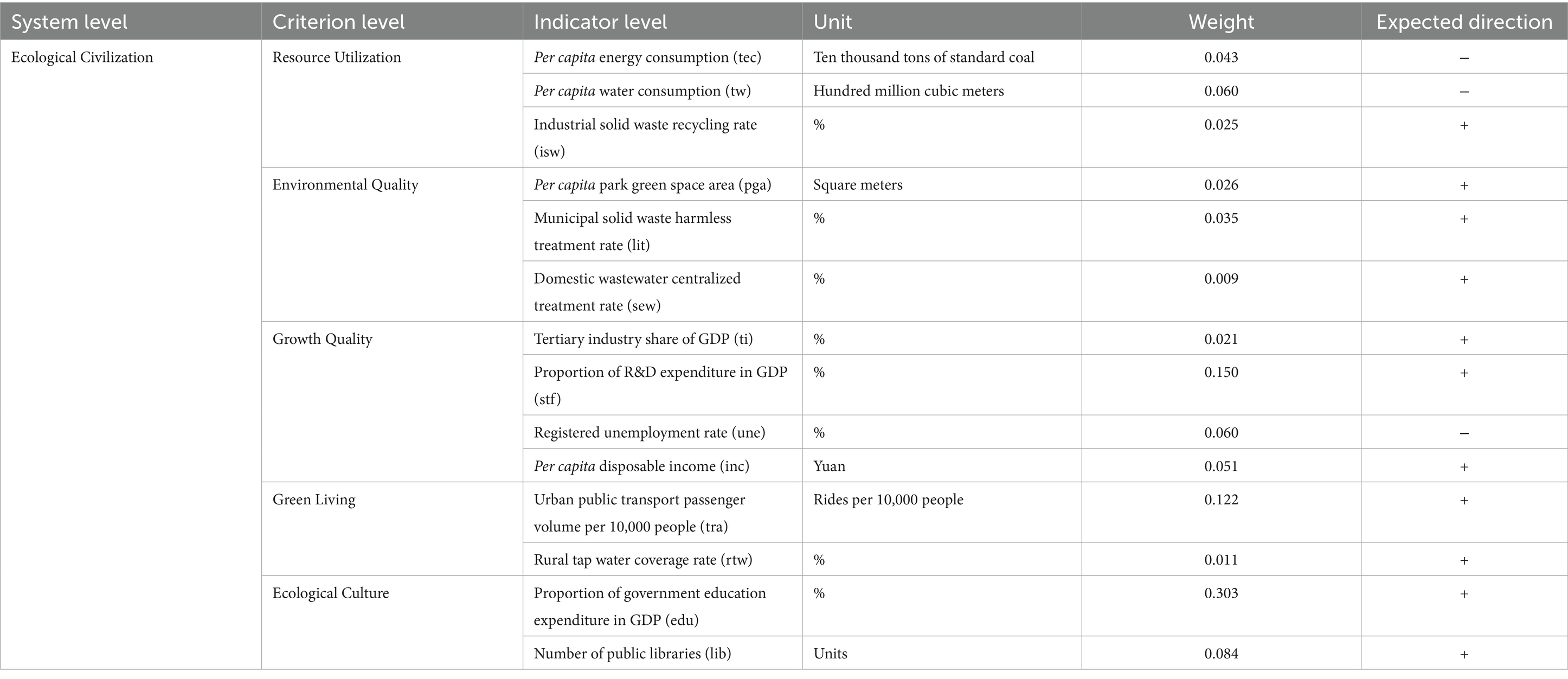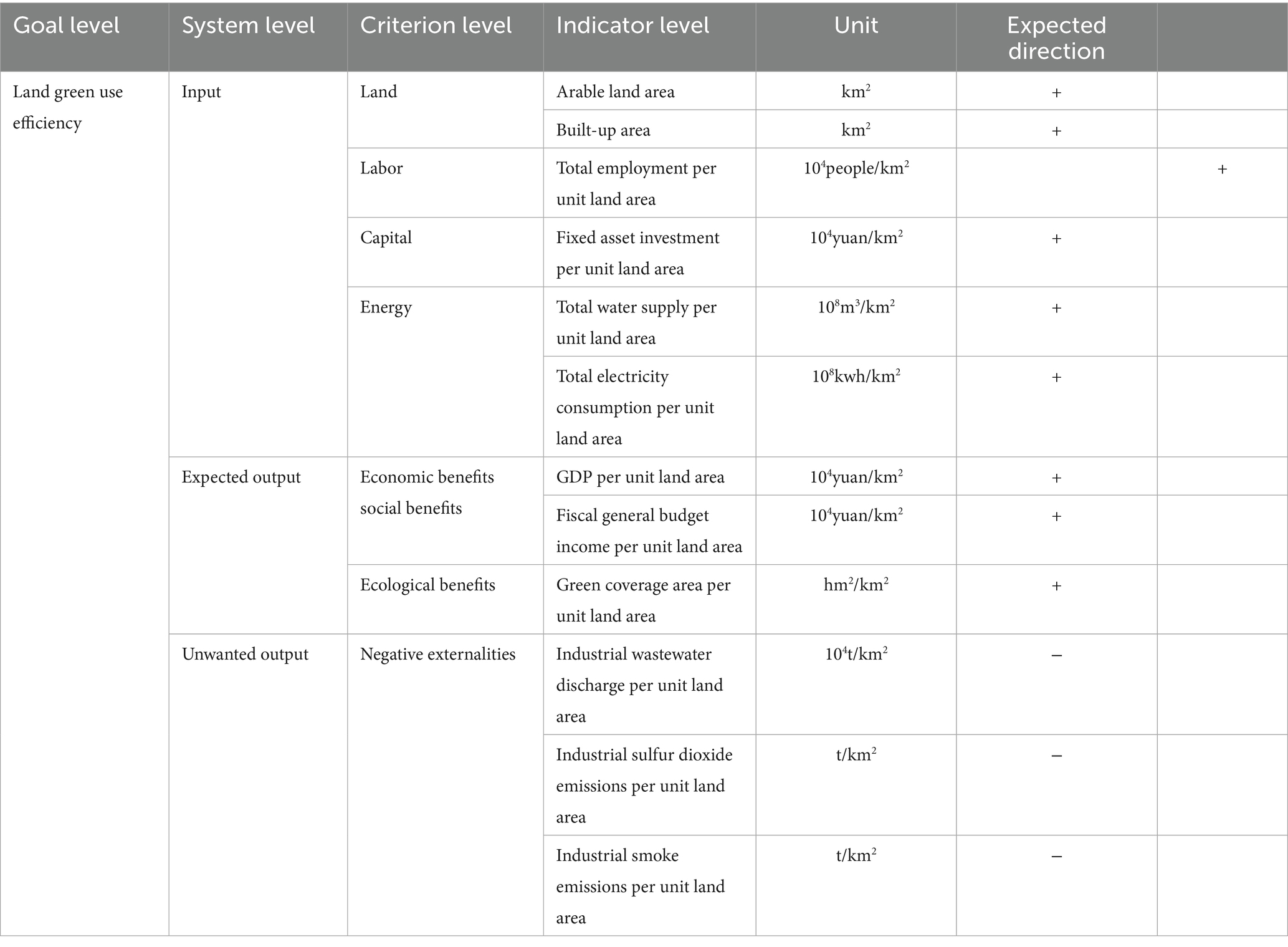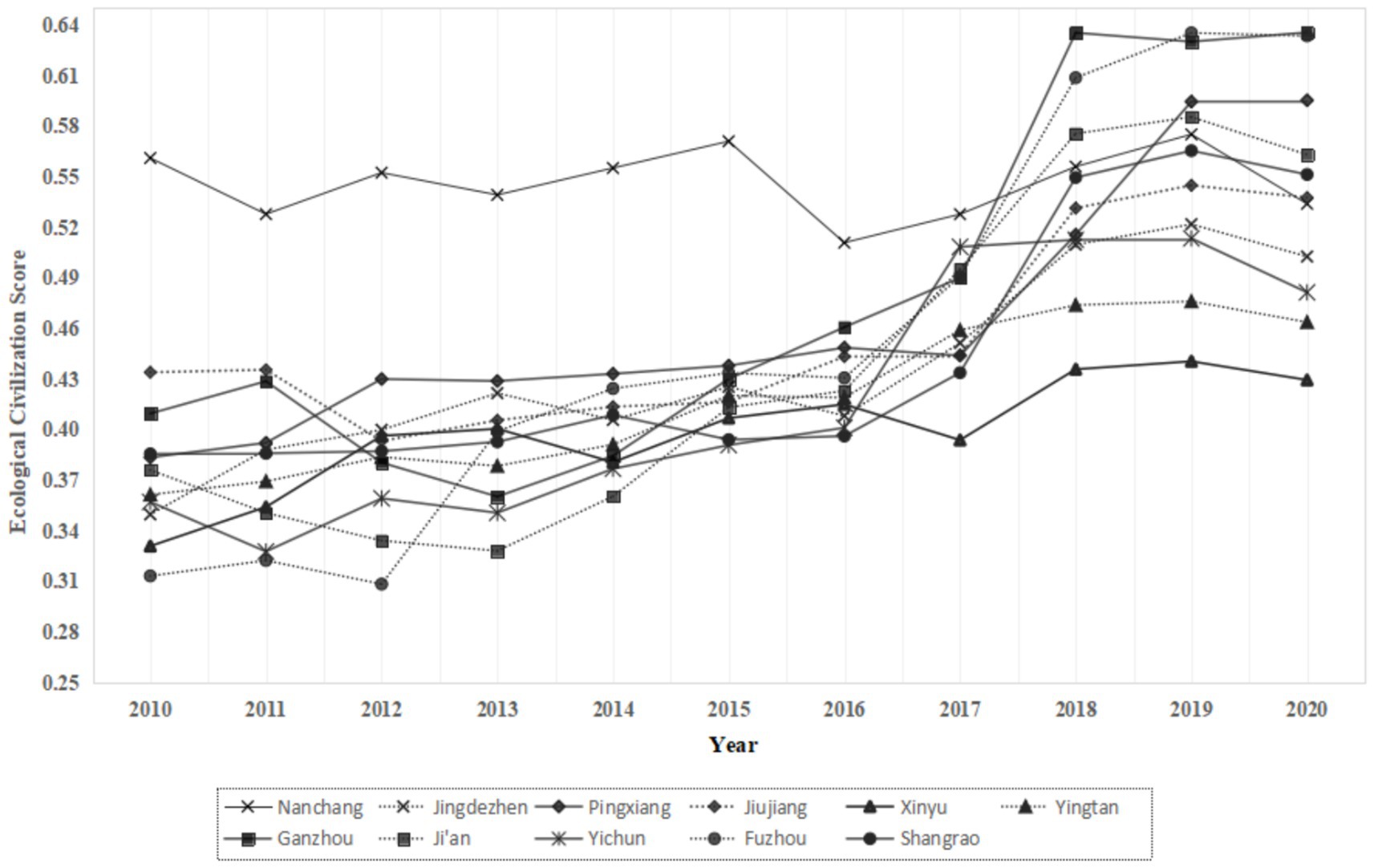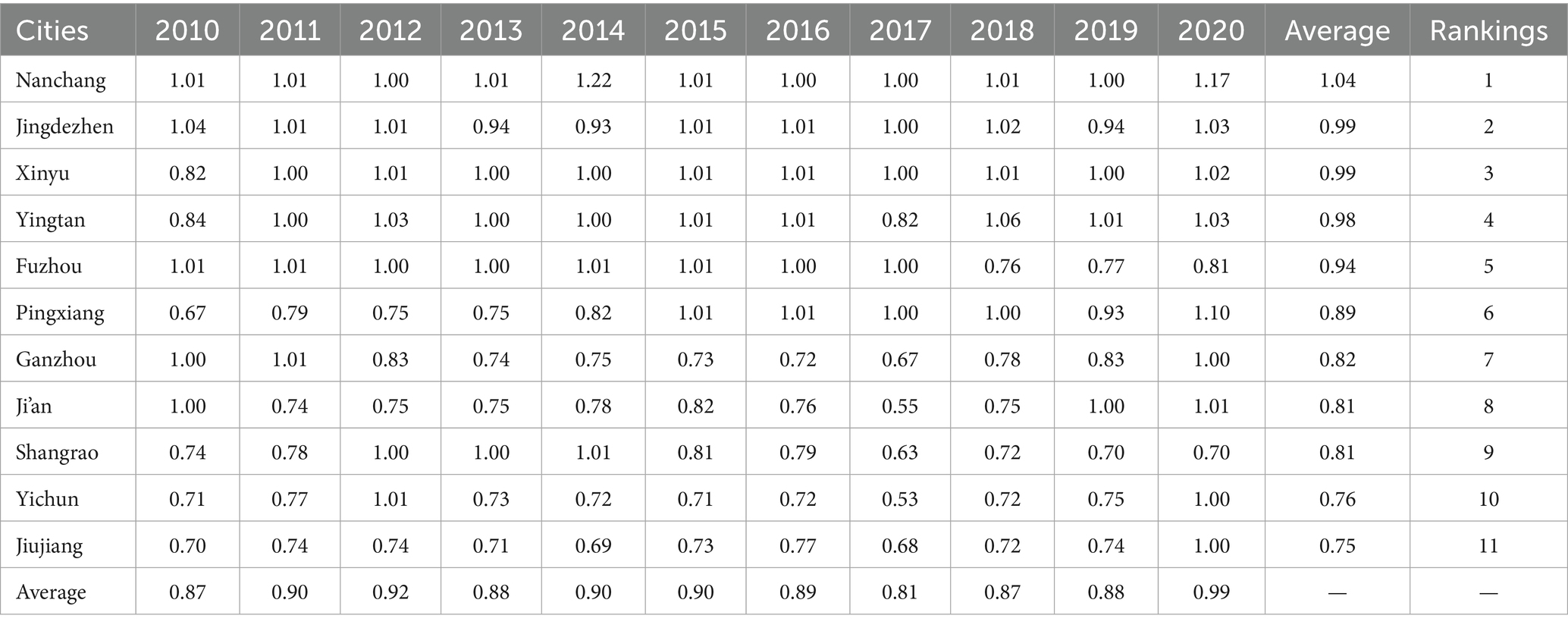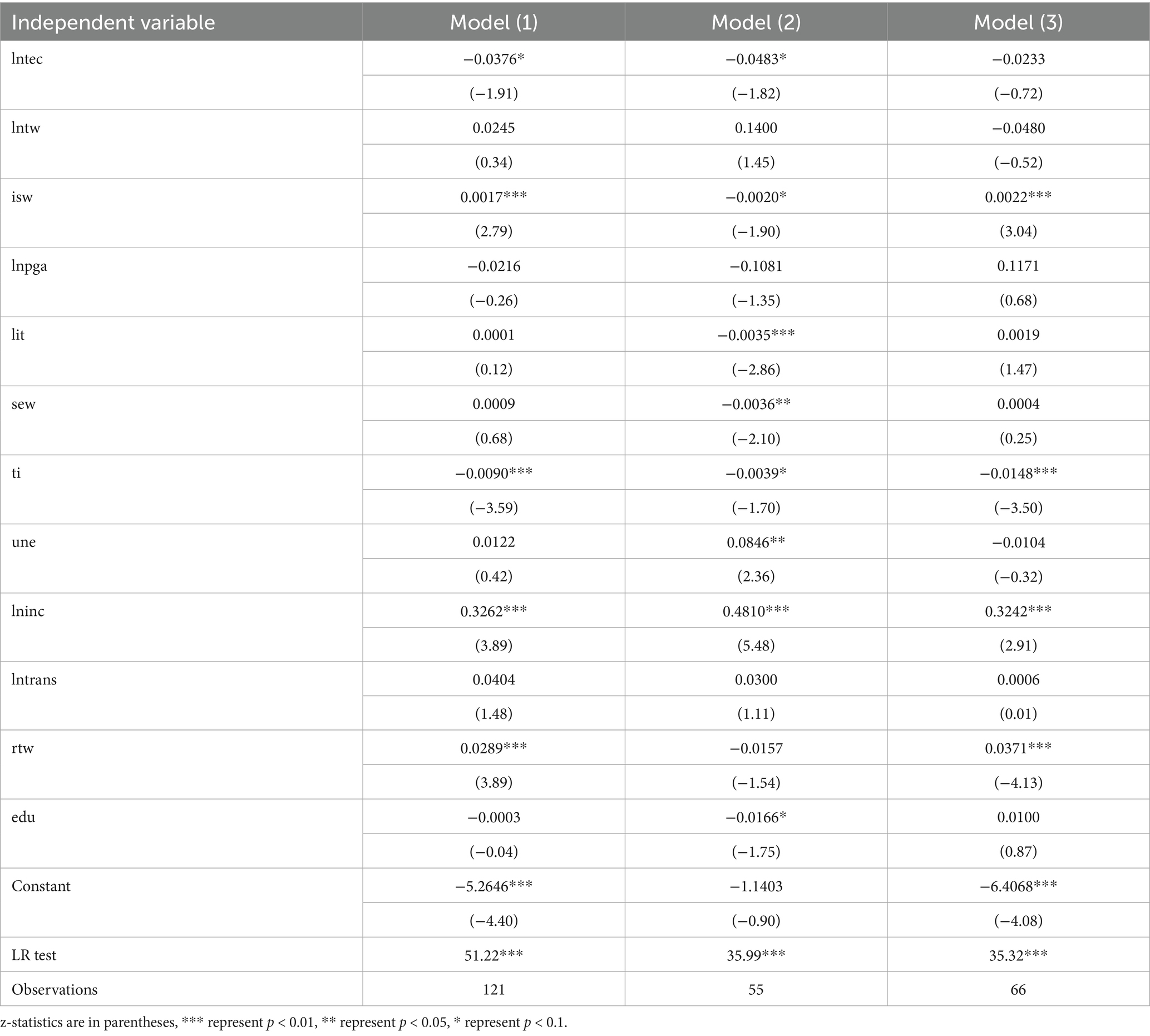- 1College of Public Administration, Central China Normal University, Wuhan, China
- 2Institute of Nature Resources Governance, Central China Normal University, Wuhan, China
- 3The Fourth Institute of Resources and Environment Investigation of Henan Province Co., Ltd, Zhengzhou, China
This study investigates the impact of China’s Ecological Civilization Construction (ECC) policy on Land Green Use Efficiency (LGUE), taking Jiangxi Province’s pilot demonstration zone as an example. Based on panel data from 2010 to 2020, and employing the entropy method, super-efficiency EBM model, and Tobit regression, the results reveal that the ECC pilot significantly improved regional ECC levels, LGUE, and the coupling coordination between them. Key influencing factors include the comprehensive utilization rate of industrial solid waste, the proportion of the tertiary industry in GDP, and per capita disposable income, with heterogeneity across cities. The findings demonstrate that the ECC policy not only promotes ecological governance but also enhances land use efficiency, suggesting the necessity of differentiated policy measures to support high-quality and sustainable regional development.
1 Introduction
Sustainable development, as a global goal pursued collectively, has garnered widespread attention from the international community (Liu et al., 2022). It refers to a development model that meets the needs of the present generation without compromising the ability of future generations to meet their own needs, encompassing three dimensions: social sustainability, economic sustainability, and ecological sustainability (United Nations, 1992). Among these, ecological sustainability is a prerequisite for achieving sustainable development and a key element in driving global environmental governance and green development (Simpson and Jewitt, 2019). However, with the acceleration of global urbanization and industrialization, issues such as tightening resource constraints, severe environmental pollution, and ecosystem degradation have become increasingly prominent, posing shared challenges for the world (Zhou, 2023; Zhuang et al., 2023). Land, as a non-renewable natural resource, underpins all human production and living activities, playing a fundamental role in the realization of sustainable development (Zheng et al., 2024; Lin and Ling, 2021; Chen and Xie, 2019).
Since the reform and opening-up, China has experienced rapid socio-economic development. However, the early extensive economic growth model led to severe land resource waste, low land use efficiency, soil pollution, and the loss of biodiversity, among other issues. As the economy gradually expanded, China also began to recognize the importance of transforming its development model, shifting from the earlier “GDP-only” approach toward a focus on sustainable development. In 2007, the concept of “ecological civilization” was introduced for the first time at the 17th National Congress of the Communist Party of China, and the goals of ecological civilization construction (ECC) were clearly outlined. By 2012, ecological civilization was incorporated into China’s Five-sphere Integrated Plan, marking the elevation of ECC to a national priority (Zou and Pan, 2023). In 2014, the Chinese government approved Jiangxi, Guizhou, Yunnan, Qinghai, and Fujian as provincial-level ecological civilization pilot zones, initiating a series of ecological civilization trials and innovations (Hu et al., 2023a; Hu et al., 2023b; Zhang et al., 2022). ECC, by promoting the rational planning and efficient use of land resources, emphasizes the protection and restoration of the ecological environment during land development. This approach aims to achieve a harmonious balance between economic development and environmental protection, effectively fostering green land utilization and ensuring the sustainability of land resources and ecological balance. Compared to traditional land use models, land green use (LGU) stresses the transformation from high-resource consumption, extensive, and expansion-oriented land use practices to more efficient, low-carbon, circular, and sustainable models (Fu, 2022). Land green use efficiency (LGUE) emphasizes that, in the process of land use, the goal should not only be the maximization of economic returns but also the integration of social benefits and ecological environmental protection. This approach aims to achieve the optimal comprehensive benefits of land use with minimal input of land resources, while simultaneously minimizing “undesirable outputs” (Niu et al., 2023). The scientific connotation of LGU aligns with the concept of harmonious coexistence between humans and nature in the construction of ecological civilization. The two are mutually reinforcing, collectively advancing the achievement of sustainable development goals.
Against the backdrop of the increasingly strained relationship between humans and resources, ECC and LGU have garnered widespread attention from scholars. Some researchers, focusing on ECC, have explored its interactive relationships with systems such as carbon emissions (Cao and Chen, 2023), tourism development (Liu and Cheng, 2019), and green development in the electricity sector (Chai et al., 2020). Other scholars have focused on topics such as the relationship between economic and social development and sustainable development (Biekša et al., 2022; Frazier et al., 2019; Jędrzejczak-Gas et al., 2024), as well as ecological environmental protection (Yang et al., 2024; Kamran et al., 2021; Chaudhary et al., 2019). From Howard’s early concept of the Garden City to the formulation of the “sustainable development” goals, the concept of ecological civilization has expanded from traditional environmental protection to encompass the entire utilization cycle of natural resources, including extraction, circulation, and recycling (Wang et al., 2021; Joseph, 2008). LGU, as an important component and practical pathway of ECC, plays a crucial role in alleviating the human-environment conflict. Currently, scholars have conducted a series of studies on LGUE, focusing on areas such as the measurement and evaluation of LGUE (Lu et al., 2020; Yang et al., 2018; Tang et al., 2021), spatial–temporal differences and influencing factorss (Ma et al., 2024; Hong and Mao, 2024; Chen et al., 2022), and coupling coordination (Ge et al., 2024; Zhang et al., 2024; Zhu et al., 2019).
The existing research reveals that substantial progress has been made, but there are still several shortcomings: Firstly, most studies address ecological civilization and LGU separately. As an important strategy for achieving sustainable development, the mechanism through which ecological civilization influences LGUE has yet to receive sufficient attention from the academic community. Secondly, existing research primarily focuses on the coupling and coordination between LGUE and urbanization or economic systems, but studies on the coupling and coordination between ECC and LGUE remain insufficient. There is an urgent need for a deeper analysis of the interactive relationship between the two. Finally, the majority of research is concentrated in urban agglomerations and specific provincial cities, but selecting cities as study areas lacks representativeness, making it difficult to reflect the overall nature of the research.
Jiangxi Province is located in the southeastern central region of China, in the middle and lower reaches of the Yangtze River. It consists of 11 prefecture-level cities: Nanchang, Jiujiang, Shangrao, Jingdezhen, Pingxiang, Xinyu, Yingtan, Ganzhou, Yichun, Ji’an, and Fuzhou, with a total area of 166,900 square kilometers. It serves as an important ecological security barrier in southern China and has long faced the dual pressures of economic development and environmental protection. As the first province in China to fully incorporate ecological civilization into its pilot demonstration area, Jiangxi Province’s practices enjoy a pioneering advantage. Exploring the relationship between ECC and LGUE in this province can provide valuable experience and insights for promoting green and low-carbon development, as well as advancing global ecological civilization and sustainable development. Based on this, this paper selects Jiangxi Province in China as the study area to analyze the interactive relationship between ECC and LGUE. The paper is divided into three main parts: the first part introduces the research methods, the construction of the indicator system, and data sources; the second part conducts an in-depth analysis of the research results; the third part discusses the findings, points out the limitations of the study, and suggests directions for future research. Specifically, this study seeks to answer the following key question: how and to what extent does the construction of ecological civilization influence land green use efficiency at the regional level? While existing literature has made progress in separately examining ECC and LGUE or their coupling with other systems, the internal logic and causal mechanisms linking ECC initiatives to land use efficiency remain underexplored. This study addresses this gap by empirically evaluating the coupling coordination between ECC and LGUE, and further identifying the main influencing factors using a Tobit regression framework. The theoretical contribution lies in clarifying how institutional innovations, such as green planning, waste management systems, and economic structural upgrading under ECC, contribute to the improvement of LGUE. Methodologically, the study integrates entropy-based evaluation, super-efficiency EBM modeling, and econometric testing, offering a replicable framework for other ecological pilot zones. The findings also provide practical implications for differentiated policy design in cities with varying degrees of coordination, promoting both ecological integrity and high-quality land use for sustainable regional development.
2 Materials and methods
2.1 Research methods
2.1.1 Entropy method
The entropy method is an objective weighting approach for multi-indicator dimensionality reduction evaluation. Its basic principle involves calculating the information entropy based on the variation of each indicator, and then using this information entropy to derive more objective indicator weights, which are subsequently used to evaluate the research target. As a relatively mature multi-indicator evaluation method, the entropy method has been widely applied in areas such as urban land ecosystem evaluation (Fang and Lou, 2019), urban land sustainability assessment (Chen et al., 2019), and land intensive use (Wang et al., 2018). The measurement of ECC levels is mathematically a multi-indicator dimensionality reduction problem. Therefore, we intend to establish an indicator system and apply the entropy method to evaluate the level of ECC across cities in Jiangxi Province. Given the maturity of the entropy method in academic research and the constraints on the length of the paper, the calculation formulas are not detailed here. The specific calculation process can be found in the referenced literature.
2.1.2 Super-efficiency EBM model with non-desired outputs
Current academic approaches to measuring efficiency primarily focus on two aspects: one is the parameter-based Stochastic Frontier Approach (SFA), and the other is the non-parametric Data Envelopment Analysis (DEA) and its extended methods. The advantage of the former lies in its statistical properties, which can be supported through relevant tests, while the advantage of the latter is its ability to handle multi-input, multi-output problems and avoid systemic biases introduced by predefined model assumptions and the distribution categories of indicator parameters. As a result, the DEA approach is more widely applied than the SFA method (Chen and Xie, 2019).
A major limitation of traditional DEA models is the assumption that all input factors change proportionally, which often does not align with actual output conditions and prevents in-depth evaluation of efficient units. The super-efficiency SBM model, which is an extension of the DEA model and incorporates non-desired outputs, addresses some of the shortcomings of the traditional DEA model by enabling a more thorough evaluation of efficient units. However, it still suffers from the issue of efficiency value distortion due to the loss of the original proportional information of the efficiency frontier projection. On the other hand, the super-efficiency EBM model with non-desired outputs overcomes the limitations of both previous models. Not only can it effectively reflect the proportional differences between target values and actual values as well as the non-radial differences in input–output variables, but it also allows for a deeper evaluation of efficient units, improving model fit and making the evaluation results more accurate (Li et al., 2023; Zou et al., 2023). Therefore, this paper applies the super-efficiency EBM model with non-desired outputs to calculate the LGUE of cities in Jiangxi Province. The MaxDEA software is used for the computation, and the model’s calculation formula is as follows:
In the formula, represents the optimal efficiency value, while , , and represent the inputs, expected outputs, non-desired outputs, and input slacks, respectively, with corresponding expected and non-expected output slacks and . , , and denote the importance levels of the input indicators, expected outputs, and non-expected outputs. represents the efficiency value under radial conditions, and indicates the importance level of the non-radial component, with the constraint 0≤ ≤1.
2.1.3 Coupling coordination degree model
Coupling refers to the phenomenon where two or more systems or modes of operation interact with each other and influence each other, leading to synergy. The coupling coordination degree reflects the extent to which subsystems interact and mutually promote one another. Essentially, it describes the dynamic trend from disordered and uncoordinated states to ordered and coordinated relationships between subsystems (Hu et al., 2023a; Hu et al., 2023b). In this paper, the evaluation scores of ECC (denoted as E) and LGUE (denoted as L) in Jiangxi Province represent the ECC system and the LGUE system, respectively. To measure the mutual influence, strength of interaction, and dynamic process between these two systems, a coupling coordination model is employed. The model formula is as follows:
In the formula, D represents the coupling coordination degree (0 ≤ D ≤ 1), with a higher D value indicating a better degree of coupling coordination between the systems. C represents the coupling degree between ECC and LGUE, and T is the composite evaluation index for both. E is the evaluation score of ECC, and L is the LGUE value. α and β are the coefficients to be determined, representing the relative importance of the two systems—ECC and LGUE. Based on existing research (Lin et al., 2021), it is assumed that both systems are of equal importance, so α = β = 0.5. According to previous studies (Bai et al., 2021), the coupling coordination degree between ECC and LGUE is classified into 10 categories as follows (Table 1).
2.1.4 Tobit model
The Tobit model was first proposed by Tobin in 1958 and is also known as the censored dependent variable model. It is suitable for analyzing data where the dependent variable is either truncated or censored. This study aims to analyze the impact of ECC in Jiangxi Province on LGUE. Given the characteristics of the data from the LGUE evaluation and ECC indicators, the Tobit model is highly suitable for analyzing the relationship between these two factors. Therefore, we employ the Tobit model to examine the impact of ECC on LGUE in Jiangxi Province. The calculation formula is as follows:
In the formula, represents the latent variable, is the observed dependent variable, denotes the independent variables, is the coefficient of the independent variables, and is the random disturbance term.
Based on the above models, we use LGUE as the dependent variable and ecological civilization-related indicators as the independent variables. To address multicollinearity, 12 indicators were selected through significance testing via the F-test. The following regression equation model is constructed:
In the formula, represents the coupling coordination degree; denotes the constant term; is the random disturbance term; represents the partial regression coefficients for different variables; i denotes different cities; t represents different time periods; and ω refers to the set of influencing factor variables incorporated into the model for analysis.
2.2 Indicator system and data
2.2.1 Ecological civilization construction indicator system
The construction of ecological civilization emphasizes the harmonious coexistence between humans and nature, offering a green development model for the world. In addressing the theoretical connotations and construction levels of ecological civilization, scholars have developed evaluation frameworks from various dimensions, including economic, environmental, natural, social, and cultural aspects (Dong et al., 2020; Du et al., 2020).
Drawing on existing evaluation frameworks, particularly referring to the specific requirements for indicator setting outlined in the Implementation Plan for the Construction of the Ecological Civilization Pilot Area in Jiangxi Province, this study aims to construct an indicator system based on five dimensions: resource utilization, environmental quality, growth quality, green living, and ecological culture. The system will evaluate the ecological civilization development level in Jiangxi Province across these five criterion layers, while considering the feasibility of indicator selection and the accessibility of data (Table 2).
2.2.2 Land green use efficiency indicator system
LGUE refers to the optimal land use combination that, under current natural, economic, technological, and social conditions, not only considers traditional economic output but also accounts for energy consumption and environmental costs. The goal is to minimize resource and environmental consumption on limited land while maximizing the economic, social, and environmental benefits. This represents the most efficient use of land resources (Lin and Ling, 2021).
Building upon the aforementioned research, we aim to construct a theoretical analysis framework for the efficiency of land green utilization through an “input-expected output-unexpected output” chain, considering dimensions such as land, labor, capital, energy input, as well as economic, social, ecological benefits, and undesirable outputs. The framework takes into account the systemicity, measurability, and relevance of the indicators, while drawing on relevant evaluation metrics to establish the following indicator system for measuring LGUE (Table 3).
2.2.3 Data sources
This paper uses panel data from 11 prefecture-level cities in Jiangxi Province between 2010 and 2020 as the research sample. The ecological civilization indicator data is primarily sourced from the Jiangxi Statistical Yearbook and the China Urban Statistical Yearbook for the years 2010–2020. Data on LGUE is obtained from the China Urban Construction Statistical Yearbook. Missing data is supplemented using the annual statistical yearbooks of the respective prefecture-level cities, the National Economic and Social Development Statistical Bulletins, and government work reports.
3 Results
3.1 Ecological civilization construction status
The entropy method evaluation of the ECC level in Jiangxi Province shows that from 2010 to 2020, the ecological civilization level in all cities of the province steadily improved. The average ecological civilization score increased from 0.34 in 2010 to 0.54 in 2020, with a gradual reduction in the disparity of ecological civilization levels among cities (Figure 1). From a temporal perspective, prior to 2016, the improvement in ECC was relatively stable across cities. However, after 2016, significant progress was made, and the rate of improvement also accelerated. This can be mainly attributed to the issuance of the Implementation Plan for the National Ecological Civilization Pilot Zone (Jiangxi) by China’s State Council in 2017 (hereafter referred to as the Implementation Plan). Following this, Jiangxi Province seized the opportunity of ecological civilization demonstration zone construction to scientifically delineate environmental management units and establish a comprehensive “three lines and one single” ecological environmental zoning and control system, resulting in a substantial overall improvement in the province’s ecological civilization level.
From a city-level perspective, in 2010, Nanchang and Jiujiang had the highest ecological civilization scores, at 0.56 and 0.43, respectively, while Fuzhou had the lowest score, at 0.31. However, by 2020, Ganzhou and Fuzhou emerged as the two cities with the most successful ecological civilization construction in Jiangxi Province, with scores of 0.64 and 0.63, respectively. Xinyu, with a score of 0.43, became the city with the lowest score. The main reasons for these changes lie in various factors: Nanchang’s per capita park green space area was much lower than that of other cities, and its wastewater treatment rate also declined, resulting in a lower overall ecological civilization score. In contrast, Ganzhou has recently innovated with the “Ecology +” development model, which reduced per capita energy consumption and increased per capita park green space, significantly improving its ECC level. Fuzhou, focusing on institutional and mechanism innovation in ECC, enhanced its proportion of the tertiary industry and expenditure on scientific and technological research, leading to notable achievements and earning its selection as the only ecological civilization pilot city in Jiangxi Province. On the other hand, Xinyu’s well-developed steel industry, with high levels of pollutant emissions and low industrial solid waste recycling rates, adversely affected its ecological civilization results, leading to its lower ranking in LGUE.
3.2 Land green use efficiency status
According to Equation 1, the super-efficiency EBM model was employed to evaluate the land green use efficiency (LGUE) in Jiangxi Province. The results demonstrate that the provincial LGUE showed a fluctuating upward trend from 2010 to 2020. The average efficiency value increased from 0.87 in 2010 to 0.99 in 2020, and the efficiency gap between cities also narrowed slightly. The standard deviation of efficiency values decreased from 0.15 in 2010 to 0.13 in 2020 (Table 4).
From the overall temporal perspective, after 2017, the average LGUE in Jiangxi Province showed a noticeable shift, transitioning from slow growth to rapid growth, and by the end of the study period, it approached a highly efficient utilization state. This trend closely correlates with the deepening practices of ECC across Jiangxi’s cities and counties. In particular, the province has actively explored various governance and technological pathways, including the integration of ecological goals into spatial planning, the acceleration of green infrastructure investment (such as eco-industrial parks and public transport systems), and the promotion of industrial restructuring toward less resource-intensive, more service-oriented economies.
Additionally, Jiangxi’s push for green brand building and ecological industry clusters—especially in cities like Ganzhou and Fuzhou—has facilitated more efficient land use models. These efforts not only reduced per capita energy and water consumption but also promoted land-saving development patterns. As a result, LGUE in Jiangxi has risen significantly, and disparities among cities have narrowed. The number of cities achieving frontier-level LGUE increased from 5 in 2010 to 9 in 2020. Furthermore, with the exception of Shangrao, all other 10 cities had efficiency values above 0.8, indicating a widespread improvement in LGUE status.
Taken together, these results suggest that the success of Jiangxi’s LGUE improvement stems not only from top-down policy guidance, but also from bottom-up innovations in spatial governance, infrastructure provision, and economic transformation. These institutional innovations may provide transferable lessons for other regions seeking to reconcile land use efficiency with ecological sustainability.
3.3 Coupling coordination relationship between ecological civilization construction and land green use efficiency
According to Equations (2)–(4), the coupling coordination degree was calculated. The results show that from 2010 to 2020, the coupling coordination degree between the ecological carrying capacity (ECC) and land green use efficiency (LGUE) in the 11 prefecture-level cities of Jiangxi Province showed a significant upward trend. Notably, after 2017, the slope of the coupling coordination curve increased significantly, indicating a marked improvement. This suggests that after the issuance of the Implementation Plan in 2017, the policy effects became evident. The province made significant efforts to protect and restore key ecological function areas, such as the “Five Rivers and One Lake,” the headwaters of the Dongjiang River, national nature reserves, and important wetlands. Additionally, it focused on addressing prominent issues such as rural environmental remediation and agricultural non-point source pollution, strengthened the regulation of natural ecological space use, and strictly adhered to the red line of arable land protection. These major measures ensured the effective implementation of the key tasks outlined in the Implementation Plan. Jiangxi’s proactive efforts led to significant improvements in the coupling coordination between ECC and LGUE (Figure 2).
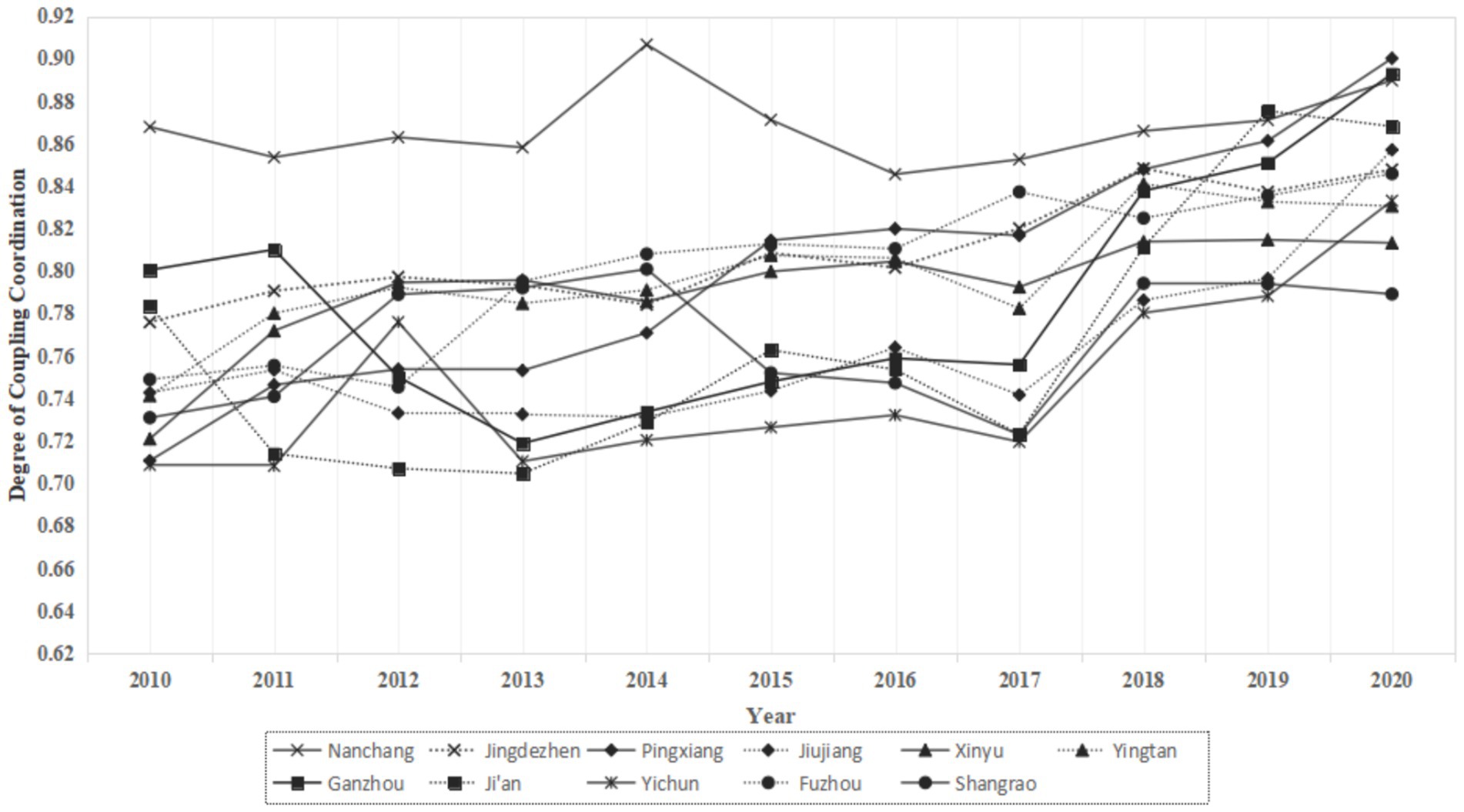
Figure 2. The coupling and coordination degree of ECC and LGUE in Jiangxi Province from 2010 to 2020.
Specifically, the coupling coordination degree of the 11 cities in Jiangxi Province increased from 0.76 in 2010 to 0.85 in 2020, marking a shift from moderate coordination to good coordination. In terms of the number of cities at each coordination type, in 2010, nine cities, including Jingdezhen, Jiujiang, and Yichun, were in a state of moderate coordination, while Nanchang and Ganzhou were in a state of good coordination. By 2020, with the exception of Shangrao, which remained at a moderate coordination level with a coupling coordination degree of 0.77, and Pingxiang, which reached a high-quality coordination level with a coupling coordination degree of 0.90, the other 8 cities had all reached a state of good coordination. This indicates that with the advancement of national ecological civilization demonstration zones and the in-depth implementation of a series of green development policies in industries such as manufacturing, aquaculture, and finance, the positive interaction between ECC and LGUE in Jiangxi Province has been significantly enhanced, leading to a noticeable improvement in the coupling coordination between the two.
At the city level, Nanchang’s coupling coordination between ECC and LGUE stands out most prominently. It has consistently been in a state of good coordination and even achieved high-quality coordination in 2014. Since 2016, its coupling coordination has steadily improved, reaching 0.89 in 2020, approaching a state of high-quality coordination. The city with the greatest improvement in coupling coordination is Pingxiang. Its coupling coordination degree increased from 0.71 in 2010 to 0.90 in 2020. This significant progress is mainly attributed to Pingxiang’s thorough implementation of national ecological civilization initiatives. By focusing on building ecological industrial demonstration zones, water ecological civilization cities, and striving to create sponge cities, Pingxiang has achieved sustained and significant improvements in both ECC and LGUE. As a result, the coupling coordination between the two subsystems has moved from good coordination to high-quality coordination, with a noticeable improvement in the overall coordination level.
In addition, by 2020, the coupling coordination between ECC and LGUE in Ganzhou, Ji’an, and Jiujiang also remained high, all reaching a good coordination state with values greater than 0.85. This can be attributed to the steady growth in both ECC and LGUE in Ganzhou, leading to a strong alignment between the two developments. In Ji’an and Jiujiang, the growth rate of ecological civilization exceeded that of LGUE, which resulted in an improvement in their coupling coordination level from the relatively low moderate coordination state to a good coordination state.
3.4 The impact of ecological civilization construction on land green use efficiency
As shown in Figures 1, 2, since 2010, the level of ECC in Jiangxi Province has gradually improved, especially after 2017, when the effects of ECC became more apparent. Additionally, the coupling coordination between ECC and LGUE has also significantly increased. From the perspective of land use, the question arises: Can the implementation of ecological civilization construction policies enhance LGUE? If a positive promotional effect exists, to what extent can these policies improve regional LGUE? A scientific assessment and quantification of the aforementioned issues are conducive to evaluating and refining the effectiveness of regional ecological civilization construction policies. This carries significant practical value for optimizing regional land resource allocation, promoting green land use, and achieving sustainable development.
Based on this, we calculate the impact of Jiangxi Province’s ECC on LGUE according to Equations (5–6). To enhance specificity and address the issue of multicollinearity due to high correlation among independent variables, the ECC indicators were first screened based on the following criteria: those with an F-test significance probability less than or equal to 0.05 were included, and those with a probability greater than 0.10 were excluded. After this process, 12 indicators were selected to enter the analysis model: per capita energy consumption (TEC), per capita water consumption (TW), industrial solid waste recycling rate (ISW), per capita park green space area (PGA), the rate of harmless treatment of domestic waste (LIT), the rate of centralized treatment of domestic sewage (SEW), the share of the tertiary industry in GDP (TI), registered unemployment rate (UNE), per capita disposable income (INC), urban public transportation passenger volume per 10,000 people (TRA), rural tap water coverage rate (RTW), and the share of government expenditure on education in GDP (EDU). The study applies logarithmic transformation to five indicators—per capita total energy consumption (TEC), per capita total water consumption (TW), per capita park green space area (PGA), per capita disposable income (INC), and urban public transportation passenger volume per 10,000 people (TRA)—to enhance the stability of the independent variables and improve the model’s applicability.
To enhance the specificity of the model, this paper examines the influencing factors from two aspects: First, a full sample analysis is conducted to assess the overall impact of ECC on LGUE in Jiangxi Province. Second, a heterogeneity analysis is carried out, focusing on the differences in coupling coordination levels. This aims to provide insights for the formulation of differentiated intervention policies for local regions. The classification of high and low coupling coordination levels is based on the median. Cities with a coupling coordination degree above the median—Nanchang, Jingdezhen, Xinyu, Yingtan, and Fuzhou—are grouped into the high-coupling coordination group, while cities with a coupling coordination degree below the median—Pingxiang, Ganzhou, Ji’an, Shangrao, Yichun, and Jiujiang—are classified into the low-coupling coordination group.
The baseline regression results based on the full sample, as shown in model (1), indicate that six indicators—per capita energy consumption, industrial solid waste recycling rate, share of the tertiary industry in GDP, per capita disposable income, and rural tap water coverage rate—are statistically significant. Among them, only per capita energy consumption is significant at the 10% level, while the other indicators are significant at the 1% level. This suggests that policies targeting these indicators are key to improving the LGUE across Jiangxi Province.
The regression results from the coupling coordination degree-based grouping in models (2) and (3) show the following: For the five cities with higher coupling coordination, the rate of harmless treatment of domestic waste and per capita disposable income are significant at the 1% level; the rate of centralized treatment of domestic sewage and the registered unemployment rate are significant at the 5% level; and per capita energy consumption, industrial solid waste recycling rate, the share of the tertiary industry in GDP, and the share of government education expenditure in GDP are significant at the 10% level. However, from the perspective of model indicator directions, industrial solid waste recycling rate, rate of harmless treatment of domestic waste, rate of centralized treatment of domestic sewage, share of the tertiary industry in GDP, and share of government education expenditure in GDP are inconsistent with the expected directions of the modeled indicators. This suggests that, in cities with high coupling coordination, these indicators have already advanced beyond the level of LGUE.
For the six cities with lower coupling coordination, the industrial solid waste recycling rate, share of the tertiary industry in GDP, per capita disposable income, and rural tap water coverage rate are all significant at the 1% level. Except for the share of the tertiary industry in GDP, the remaining indicators are consistent with the expected direction of the model.
Overall, the industrial solid waste recycling rate, the share of the tertiary industry in GDP, and per capita disposable income are key indicators affecting the current LGUE in Jiangxi Province. Therefore, the province can implement intervention policies targeting these indicators in its ecological civilization construction practices to improve LGUE and achieve a synergistic advancement of both ECC and land green utilization (Table 5).
4 Conclusion and discussion
As the first provincial-level ecological civilization pilot zone in China, Jiangxi Province provides a valuable case for examining how ecological governance can support sustainable land use. This study integrates the entropy method, super-efficiency EBM model, and Tobit regression to assess the interaction between ecological civilization construction (ECC) and land green use efficiency (LGUE). The findings highlight three key insights: (1) Since the launch of the Implementation Plan in 2017, both ECC and LGUE in Jiangxi have improved markedly, indicating policy effectiveness (2) The coupling coordination between ECC and LGUE has transitioned from moderate to good levels in most cities, reflecting an increasingly synergistic relationship (3) Industrial solid waste recycling rate, the share of the tertiary industry, and per capita disposable income are identified as core drivers of LGUE, though their effects vary across regions with different coordination levels.
Despite these insights, the study acknowledges limitations in indicator coverage—particularly for non-urban areas—and calls for future research to incorporate broader spatial dimensions and governance mechanisms. Nonetheless, the results offer practical implications for tailoring green development strategies and provide a replicable policy reference for other regions striving toward sustainable land management under the framework of ecological civilization.
Data availability statement
The original contributions presented in the study are included in the article/supplementary material, further inquiries can be directed to the corresponding author.
Author contributions
JH: Data curation, Resources, Writing – original draft, Writing – review & editing. MZ: Data curation, Writing – original draft. NM: Methodology, Validation, Writing – original draft. YJ: Methodology, Visualization, Writing – review & editing.
Funding
The author(s) declare that no financial support was received for the research and/or publication of this article.
Conflict of interest
YJ was employed by The Fourth Institute of Resources and Environment Investigation of Henan Province Co., Ltd.
The remaining authors declare that the research was conducted in the absence of any commercial or financial relationships that could be construed as a potential conflict of interest.
Generative AI statement
The authors declare that no Gen AI was used in the creation of this manuscript.
Publisher’s note
All claims expressed in this article are solely those of the authors and do not necessarily represent those of their affiliated organizations, or those of the publisher, the editors and the reviewers. Any product that may be evaluated in this article, or claim that may be made by its manufacturer, is not guaranteed or endorsed by the publisher.
References
Bai, Y., Hong, Z., Xue, X., and Shi, W. (2021). Research on coupling of intensive land use and ecological civilization construction of urban agglomeration in Guanzhong plain. Res. Soil Water Conserv. 28, 272–280. doi: 10.13869/j.cnki.rswc.20210203.004
Biekša, K., Valiulė, V., Šimanskienė, L., and Silvestri, R. (2022). Assessment of sustainable economic development in the EU countries with reference to the SDGs and environmental footprint indices. Sustainability 14:11265. doi: 10.3390/su141811265
Cao, P., and Chen, R. (2023). Research on the impact path of ecological civilization construction on carbon emission based on fsqca method. Front. Ecol. Evol. 11, 1–14. doi: 10.3389/fevo.2023.1172180
Chai, J., Zhang, L., Yang, M., Nie, Q., and Nie, L. (2020). Investigation on the coupling coordination relationship between electric power green development and ecological civilization construction in China: a case study of Beijing. Sustainability 12:8845. doi: 10.3390/su12218845
Chaudhary, S., Wang, Y., Dixit, A. M., Khanal, N. R., Xu, P., Yan, K., et al. (2019). Eco-environmental risk evaluation for land use planning in areas of potential farmland abandonment in the high mountains of Nepal Himalayas. Sustainability 11:6931. doi: 10.3390/su11246931
Chen, M., Wang, Q., Bai, Z., Shi, Z., Meng, P., and Hao, M. (2022). Green land use efficiency and influencing factors of resource-based cities in the Yellow River Basin under carbon emission constraints. Buildings 12:551. doi: 10.3390/buildings12050551
Chen, M., Wang, M., and Yin, H. (2019) Evaluation of sustainable urban land use based on weighted Topsis method: a case study of Chengdu City Iop conference series. Earth and environmental science 227 62026
Chen, Q., and Xie, H. (2019). Temporal-spatial differentiation and optimization analysis of cultivated land green utilization efficiency in China. Land 8:158. doi: 10.3390/land8110158
Dong, F., Pan, Y., Zhang, X., and Sun, Z. (2020). How to evaluate provincial ecological civilization construction? The case of Jiangsu Province, China. Int. J. Environ. Res. Public Health 17:5334. doi: 10.3390/ijerph17155334
Du, Y., Qin, W., Sun, J., Wang, X., and Gu, H. (2020). Spatial pattern and influencing factors of regional ecological civilisation construction in China. Chin. Geogr. Sci. 30:776-790. doi: 10.1007/s11769-020-1145-9
Fang, W., and Lou, L. (2019) Constructing the evaluation system of urban land ecosystem based on entropy method and analytic hierarchy process-taking Shaanxi Province as an example Iop conference series. Earth and environmental science 295 12072
Frazier, A. E., Bryan, B. A., Buyantuev, A., Chen, L., Echeverria, C., Jia, P., et al. (2019). Ecological civilization: perspectives from landscape ecology and landscape sustainability science. Landsc. Ecol. 34, 1–8. doi: 10.1007/s10980-019-00772-4
Fu, J. D. R. Z. (2022). The spatial-temporal transition and influencing factors of green and low-carbon utilization efficiency of urban land in China under the goal of carbon neutralization. Int. J. Environ. Res. Public Health 19:16149. doi: 10.3390/ijerph192316149
Ge, K., Wang, Y., Ke, S., and Lu, X. (2024). Research on the spatiotemporal evolution and driving mechanism of coupling coordinating between green transition of urban land use and urban land use efficiency: a case study of the Yangtze River Delta region in China. Environ. Sci. Pollut. Res. Int. 31, 57002–57024. doi: 10.1007/s11356-023-31072-9
Hong, J., and Mao, Y. (2024). How does the green efficiency of urban land use evolve in the urban agglomeration of China's middle Yangtze river? Nat. Resour. Model. 37:1. doi: 10.1111/nrm.12392
Hu, X., Dong, C., and Wang, Y. (2023b). Coupled and coordinated analysis of urban green development and ecological civilization construction in the Yangtze River Delta region. Sustainability 15:5955. doi: 10.3390/su15075955
Hu, J., Hu, M., and Zhang, H. (2023a). Has the construction of ecological civilization promoted green technology innovation? Environ. Technol. Innov. 29:102960. doi: 10.1016/j.eti.2022.102960
Jędrzejczak-Gas, J., Wyrwa, J., and Barska, A. (2024). Sustainable energy development and sustainable economic development in EU countries. Energies 17:1775. doi: 10.3390/en17071775
Joseph, H. (2008). Pioneer countries and the global diffusion of environmental innovations: theses from the viewpoint of ecological modernisation theory. Glob. Environ. Change 18, 360–367.
Kamran, M., Bian, J., Li, A., Lei, G., Nan, X., and Jin, Y. (2021). Investigating eco-environmental vulnerability for China–Pakistan economic corridor key sector Punjab using multi-sources geo-information. ISPRS Int. J. Geo Inf. 10:625. doi: 10.3390/ijgi10090625
Li, X., Zhao, L., Chang, X., Yu, J., Song, X., and Zhang, L. (2023). Spatial and temporal evolution of the eco-efficiency of cultivated land use in the region around Beijing–Tianjin based on the super-Ebm model. Front. Ecol. Evol. 11, 1–15. doi: 10.3389/fevo.2023.1297570
Lin, Q., and Ling, H. (2021). Study on green utilization efficiency of urban land in Yangtze River Delta. Sustainability 13:11907. doi: 10.3390/su132111907
Lin, S., Lu, R., Ye, Z., Bao, B., and Wei, Q. (2021). Spatiotemporal differentiation of coupling the intensive use of urban land and the construction of ecological civilization in Guangxi. Res. Soil Water Conserv 28, 301–308.
Liu, H. M., and Cheng, D. P. (2019) Research on the construction mode of Guangxi ecological civilization driven by ecotourism Iop conference series. Earth and environmental science 267 52038
Liu, Y., Tang, L., and Liu, G. (2022). Carbon dioxide emissions reduction through technological innovation: empirical evidence from Chinese provinces. Int. J. Environ. Res. Public Health 19:9543. doi: 10.3390/ijerph19159543
Lu, X., Qu, Y., Sun, P., Yu, W., and Peng, W. (2020). Green transition of cultivated land use in the Yellow River Basin: a perspective of green utilization efficiency evaluation. Land 9:475. doi: 10.3390/land9120475
Ma, D., Zhang, J., An, B., Guo, Z., Zhang, F., Yan, Y., et al. (2024). Research on urban land green use efficiency and influencing factors based on DEA and ESTDA models: taking 284 cities in China as an example. Ecol. Indic. 160:160111824.
Niu, S., Luo, X., Yang, T., Lin, G., and Li, C. (2023). Does the low-Carbon City pilot policy improve the urban land green use efficiency?—investigation based on multi-period difference-in-differences model. Int. J. Environ. Res. Public Health 20:2704. doi: 10.3390/ijerph20032704
Simpson, G. B., and Jewitt, G. P. (2019). The development of the water-energy-food nexus as a framework for achieving resource security: a review. Front. Environ. Sci. 78, 1–9.
Tang, Y., Wang, K., Ji, X., Xu, H., and Xiao, Y. (2021). Assessment and spatial-temporal evolution analysis of urban land use efficiency under green development orientation: case of the Yangtze River Delta urban agglomerations. Land 10:715. doi: 10.3390/land10070715
United Nations. (1992). Rio Declaration on Environment and Development. Report of the United Nations Conference on Environment and Development (A/CONF.151/26 Vol. I, Annex I). Available at: https://www.un.org/documents/ga/conf151/aconf15126-1annex1.htm
Wang, T., Jiang, X., Wang, H., Tang, T., and Xiao, Y. (2018). Research on measurement and coupling coordination of land intensive utilization and new urbanization. IOP Conference Series: Materials Science and Engineering 394, 052052.
Wang, M., Ma, Y., Liu, W., Wang, Y., and Li, X. (2021). Coupling and coordination relationship between resource recycling and ecological civilization construction. Res. Sci. 43, 577–587.
Yang, J., Deng, W., Zhang, G., and Cui, X. (2024). Linking endangered species protection to construct and optimize ecological security patterns in the national ecological civilization construction demonstration zone: a case study of Yichang, China. Ecol. Indic. 158:111579. doi: 10.1016/j.ecolind.2024.111579
Yang, K., Wen, Q., and Zhong, T. (2018). Assessment of urban land use efficiency in the Yangtze River Economic Belt. Res. Sci. 40, 2048–2059.
Zhang, F., Xie, A., Jiang, C., Chen, J., An, Y., Yang, P., et al. (2024). Coupling coordination analysis and spatiotemporal heterogeneity between urban land green use efficiency and ecosystem services in Yangtze River Economic Belt, China. Humanit. Soc. Sci. Commun. 11:1328. doi: 10.1057/s41599-024-03752-5
Zhang, Z., Xu, H., Shan, S., Lu, Y., and Duan, H. (2022). The impact of ecological civilization construction on environment and public health-evidence from the implementation of ecological civilization demonstration area in China. Int. J. Environ. Res. Public Health 19:5361. doi: 10.3390/ijerph19095361
Zheng, B., Xiao, Z., Liu, J., Zhu, Y., Shuai, K., Chen, X., et al. (2024). Vertical differences in carbon metabolic diversity and dominant flora of soil bacterial communities in farmlands. Sci. Rep. 14:9445. doi: 10.1038/s41598-024-60142-2
Zhou, J. (2023). Spatial–temporal evolution and spatial spillover of the green efficiency of urban construction land in the Yangtze River Economic Belt, China. Sci. Rep. 13:14387.
Zhu, Q., Liu, P., Luan, J., and Yang, N. (2019). Coupling relationship between urban land intensive use and ecological civilization construction. J. Zhejiang A&F Univ. 36, 999–1005.
Zhuang, Y., Xie, D., and Yu, X. (2023). Urban tree canopy and environmental justice: examining the distributional equity of urban tree canopy in Guangzhou, China. Int. J. Environ. Res. Public Health 20:4050. doi: 10.3390/ijerph20054050
Zou, X., Ge, T., and Xing, S. (2023). Impact of the urban-rural income disparity on carbon emission efficiency based on a dual perspective of consumption level and structure. Sustainability 15:11475. doi: 10.3390/su151411475
Keywords: land green use, ecological civilization, land green use efficiency, sustainable development, China
Citation: Han J, Zhou M, Meng N and Ji Y (2025) Has China’s ecological civilization construction enhanced land green use efficiency? A case study of the pilot demonstration zone in Jiangxi Province. Front. Sustain. Food Syst. 9:1647428. doi: 10.3389/fsufs.2025.1647428
Edited by:
Weiwei Zheng, Northwest A&F University, ChinaReviewed by:
Xu Jiang, Chongqing University, ChinaShanlin Huang, Northeast Agricultural University, China
Copyright © 2025 Han, Zhou, Meng and Ji. This is an open-access article distributed under the terms of the Creative Commons Attribution License (CC BY). The use, distribution or reproduction in other forums is permitted, provided the original author(s) and the copyright owner(s) are credited and that the original publication in this journal is cited, in accordance with accepted academic practice. No use, distribution or reproduction is permitted which does not comply with these terms.
*Correspondence: Yuxin Ji, Mjc1ODcwMDkxQHFxLmNvbQ==
 Jing Han
Jing Han Miao Zhou
Miao Zhou Ni Meng1
Ni Meng1